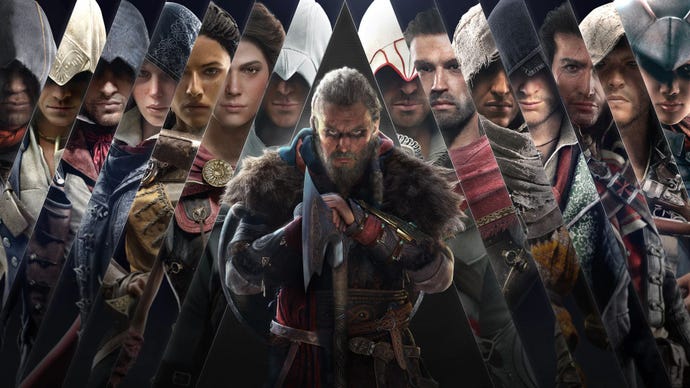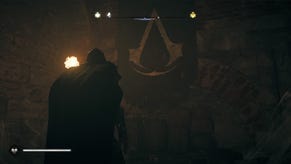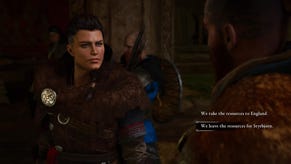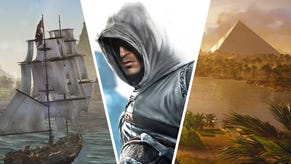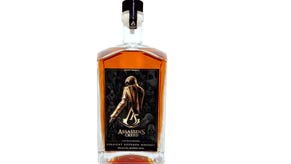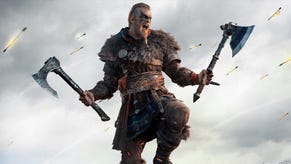The original Assassin's Creed trilogy would have ended with Desmond and Lucy leaving on a spaceship
To boldly go.. okay, you know the rest.
The ending to the third Assassin's Creed game was originally intended to end quite differently, according to interviews with staffers that worked on the titles and conducted by a Ph.D. student.
In a paper written by Lars de Wildt, who researches conspiracy theories, religion, and other beliefs in digital media culture, the original ending to Assassin's Creed 3 would have seen Desmond and Lucy leave Earth on a spaceship - the plan being to continue the human race elsewhere after the end of the world in 2012. Like a modern-day Adam and Eve.
Instead, things turned out differently. Lucy died in Assassin's Creed: Brotherhood, and in Assassin's Creed 3, Desmond sacrificed himself to protect the planet from a solar flare that would have caused the Second Disaster.
According to de Wildt's paper (thanks, Eurogamer), the original plan for the trilogy ending was pieced together based on interviews with Assassin's Creed creator Patrice Desilets and Assassin's Creed 3's creative director Alex Hutchinson.
"Briefly put, the third game would end with a resolution of the conflict in the present day, with Desmond Miles taking down Abstergo using the combined knowledge and skills of all his ancestors, including AC1's Altair and AC2's Ezio," wrote de Wildt in a footnote.
"Also, it is the end of the world in 2012, and Desmond Miles and Lucy are starting a new civilization somewhere else - as Adam and Eve."
Series creator Desilets told de Wildt: "That's why she's called Lucy, after the Australopithecus afarensis." As for where Desmond and Lucy were heading? "Boom! It's a freaking spaceship!" Desilets replied.
Assassin's Creed 3 starred Connor Kenway, also known as Ratonhnhake:ton, who was an assassin during the Revolutionary War. While the modern-day part of the story still focused on Desmond, the series went on after his story wrapped up. The next entry in the franchise, Black Flag, starred privateer turned pirate Edward Kenway, grandfather of Ratonhnhake:ton.
The game was followed by Assassin's Creed: Rogue, which takes place between Black Flag and AC3. Set during the French and Indian War from 1752 to 1760, it follows Shay Patrick Cormac, an Irish American Assassin-turned-Templar who hunts down former members of his Brotherhood. Assassin's Creed: Unity, which has ties to Rogue and was released the same day, is the successor to Black Flag and is set in Paris during the French Revolution. It stars Arno Dorian and his efforts to expose the true powers behind the Revolution while seeking revenge over his father's murder, which was carried out by Rogue's Cormac.
It was followed by Syndicate, set during London's second Industrial Revolution. It follows twin Assassins, Jacob and Evie Frye. The next installment went all the way back to 49–43 BC Egypt. Playing as Bayek, the game explores the origins of the conflict between the forerunners of the Assassin Brotherhood and the forerunners of the Templar Order. The next game moved forward into 431-422 BC where you play as a mercenary during the Peloponnesian War between Athens and Sparta. The modern segments star Layla Hassan, whose story arc started in Origins. And finally, this brings us to the current Assassin's Creed game, Valhalla. Set during 872–878 AD, the game focuses on the Vikings invading the British Isles, whereas the raider Eivor you become involved in the long struggle between the Brotherhood and the Templars. The modern-day story once again focuses on Layla Hassan, who is reliving Eivor's memories to try and find a way to save Earth from destruction.
So you see, if the series had ended with Desmond and Lucy leaving earth on a course to propagate the human race, we would never have had 12 games in the series, let alone all of the spin-offs. Well, maybe we would have, should the developers had decided to tell more stories in the series, but it would have kind of ruined things knowing the ending to the main trilogy's storyline.
